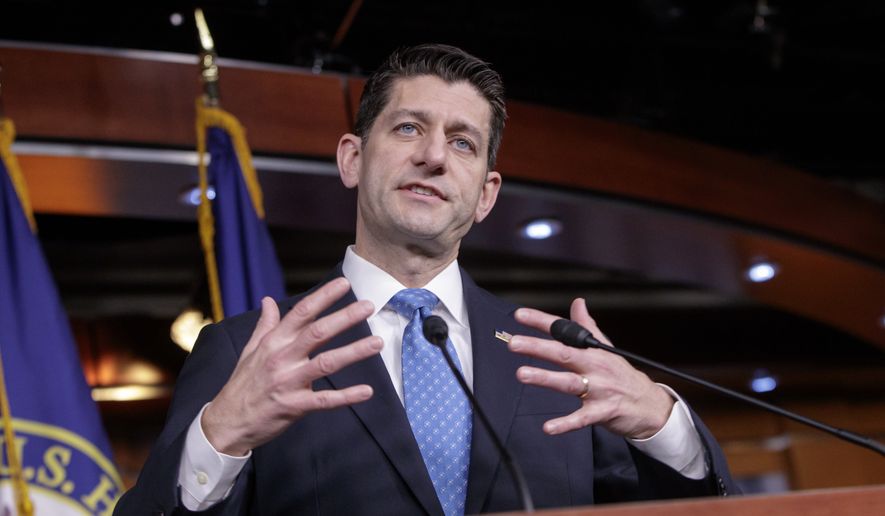House Speaker Paul D. Ryan said Tuesday his GOP troops are having constructive talks on reviving the stalled effort to repeal and replace Obamacare, though cautioned they were still in the “conceptual” stage and hadn’t reached an agreement on the thorny issue.
The White House breathed new life into the debate by floating a potential compromise that would empower states to request a waiver from some Obamacare regulations.
Hard-line conservatives in the House Freedom Caucus had balked at a plan pushed by Mr. Trump and GOP leaders that would have left those rules intact, saying the plan wouldn’t drive down premiums.
“It’s premature to say where we are or what we’re on, because we’re at that conceptual stage right now,” said Mr. Ryan, Wisconsin Republican.
Vice President Mike Pence met with members of the Freedom Caucus late Monday to talk about a way forward after Mr. Trump singled out the lawmakers in a series of harsh tweets, saying they needed to get on board with the rest of the party.
Mr. Ryan said the vice president was instrumental in bringing the party together.
“We don’t have bill text or an agreement yet, but this is the kind of conversations we want,” he said.
Republicans had wanted to pass an Obamacare repeal by the Easter recess that begins this weekend. Now, Mr. Ryan said he will not put an “artificial deadline” on passing a new bill.
The GOP push to pass a health overhaul within three weeks in March failed in embarrassing fashion, after conservatives said the plan amounted to “Obamacare lite” and centrists said the plan was too harsh.
Obamacare supporters fear an emerging offer from the Trump administration might be a more direct strike at protections built into the 2010 law.
The tentative offer would allow states to apply for a waiver that scraps the portion of Obamacare requiring insurers to cover a list of essential health benefits, including maternity and mental health care, and “community rating” regulations that bar insurers from charging sick people more than the healthy.
Insurers would still have to accept people with preexisting medical conditions, but critics of the offer say it is meaningless if sick consumers have the pay exorbitant prices.
Mr. Trump had promised to promote a plan that takes care of those who are already sick.
Conservatives say people who are priced out of the market can be taken care of in separate high-risk pools, though policy analysts say those would have to be adequately subsidized to work.
Like Mr. Ryan, members of the Freedom Caucus have cautioned there is no new legislative text, so any talk of a “deal” on health care would be premature.
The White House has signaled that Mr. Trump is still listening to all sides, even Democrats, as Mr. Trump seeks a legislative victory on health care.
Rep. Joseph Crowley, chairman of the House Democratic Caucus, said Tuesday the GOP would be better off trying to find a bipartisan consensus on improvements to the Affordable Care Act than caving to the demands of their party’s right wing.
“Our Republican colleagues are at it once again,” the New York Democrat said. “After a striking defeat earlier this month, the Trump administration and the GOP are huddling in backrooms yet again to rob the hardest-working Americans of affordable health care. I have said it before and I will say it again because it bears repeating: this is shameful.
“Quite frankly at this point I think they would be better off abandoning any attempt to repeal and replace, but that is their politics,” Mr. Crowley said. “If they want to continue to do that I think it is wasting time. I think we can do more to adjust and improve the act that exists today.”
Democrats say Mr. Trump and some Republicans would likely support broad efforts to drive down prescription drug prices or improve health outcomes in rural or underserved areas.
Yet GOP leaders have rejected Democrats’ specific proposals to fix Obamacare, such as offering more generous subsidies or establishing a government-run “public option” to compete with private plans in the law’s web-based insurance exchanges.
Obamacare extended coverage to more than 20 million people but fell short of enrollment targets, particularly among young and healthy people, on the exchanges that allow people without coverage from a job or government program to shop for insurance, often with the help of taxpayer-funded subsidies.
Insurers responded by hiking their rates or leaving the marketplace altogether. UnitedHealth Group and Aetna kicked off the exodus from some markets last year, while Humana in recent months said it would pull out of the program altogether in 2018.
The problem got worse Monday, when Wellmark Blue Cross & Blue Shield said it was pulling out of the individual market in Iowa, meaning 21,000 customers will have to find a new carrier next year.
Two other carriers operate in the state but haven’t committed to participating next year, raising fears that some Iowans will be left without options.
The Trump administration highlighted the news Tuesday, saying it offers “further evidence that Obamacare is fatally flawed and unsustainable.”
“As the law continues to fail on its own, more Americans are presented with higher health care costs and fewer options for coverage,” said Health and Human Services Department spokeswoman Alleigh Marre. “Repealing and replacing the law remains the best option and administrative action alone cannot save it. Secretary [Tom] Price remains committed to doing what can be done to protect Americans, help stabilize the market and mitigate Obamacare’s harmful effects.”
• Tom Howell Jr. can be reached at thowell@washingtontimes.com.
• Seth McLaughlin can be reached at smclaughlin@washingtontimes.com.




Please read our comment policy before commenting.